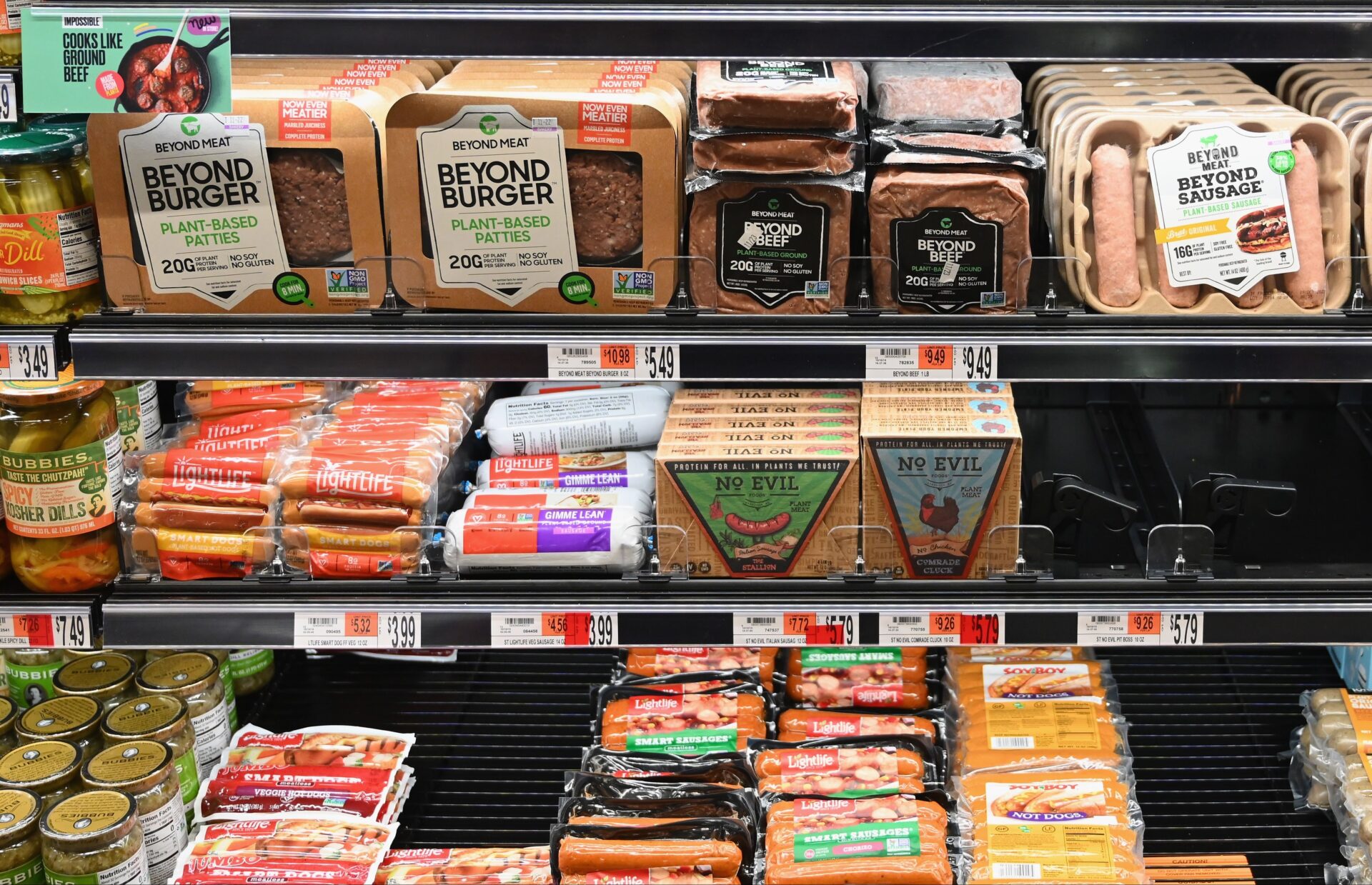
ANGELA WEISS/AFP via Getty Images
Eager Israeli food startups shrug off Beyond Meat’s market woes
Plunge in plant-based burger producer's stock, once worth $14 billion, has industry racing for alternatives to eating animals
When Beyond Meat Inc. went public in May 2019, investor excitement over the sizzle of its plant-based burgers sent the stock soaring, giving the California-based company a market value of almost $14 billion. Three years later, the shares have fallen more than 90%, fueling concern about whether consumer demand for meat alternatives will live up to the expectations they’ve generated.
In Israel, home to a thriving vegan culinary culture and more than 400 food-tech startups, the prevailing outlook is optimistic. While several Israeli companies are producing plant-based versions of beef, chicken and fish – as well as eggs and dairy products – another frontier of so-called cultivated meat, which is made from animal cells grown in a lab, is gaining traction.
“Plant-based meat as it is today won’t get people to stop eating meat,” Guy Nevo Michrowski, CEO of Israel’s ProFuse Technology, told The Circuit. “The only thing that will get them to switch is something that really tastes like meat and that is what is already happening.”
ProFuse raised $2.5 million last month in a funding round led by New York’s Green Circle. Investors included Tnuva, one of Israel’s top two food producers; beverage-maker Tempo; OurCrowd, a Jerusalem-based platform for crowdfunded venture capital investment; and Newport Beach, Calif.-based Finistere Ventures.
Until now, high cost and lengthy production time have been the main problems in making cultivated meat marketable. If these can be solved, cultivated meat can take off exponentially as demand continues to grow, Michrowski said, citing projections that meat consumption will double by 2050 as the world’s population reaches 10 billion. Despite the initial hype, he said, companies like Beyond Meat and Redwood City-based Impossible Foods have not produced a satisfactory substitute for steak-lovers. Michrowski himself is a vegan for ideological reasons, but says he has no problem eating cultivated meat.
ProFuse’s technology, which nurtures the cells in a nourishing liquid, was developed over six years of research at Israel’s Weizmann Institute of Science. The process can potentially enable the large-scale manufacture of meat in bioreactors at a cost similar to producing farm-grown beef, chicken and pork, Stu Strumwasser, managing director of Green Circle, said last month after the new investment was announced. ProFuse’s method “may substantially accelerate that process and thus fundamentally change the calculus for the commercialization of lab-grown meat,” he said.
Another Israeli company working on cultivated meat is Aleph Farms, which gained fame for producing the world’s first lab-grown steak. With actor Leonardo Dicaprio among its investors, Aleph Farms raised $105 million last year to bring its steaks to market by 2023. The funding round was led by DisruptAD, the venture capital platform of the Abu Dhabi sovereign wealth fund ADQ, and the Growth Fund of Greenwich, Conn.-based L Catterton, the largest global consumer-focused private equity firm. The company’s process of cultivating cells extracted from cattle was developed at Israel’s Technion Institute of Technology and supported by Strauss Group, Israel’s other top food manufacturer.
The United Arab Emirates and Bahrain, which import the vast majority of their food, have been developing partnerships with Israeli food-tech companies since the 2020 Abraham Accords, which normalized relations between Israel and the two Gulf states. Aleph Farms and DisruptAD have discussed building a manufacturing facility in Abu Dhabi to produce cultivated meat products and sell them across the Gulf.
The alternative protein market as a whole drew $1.75 billion in investment in the first half of 2022, according to the Good Food Institute Israel. Of that, $320 million was invested in Israeli companies, second only to the U.S. Consumer demand for plant-based alternatives (PBA) to meat, however, have stalled in the U.S., according to a report by Deloitte published in September.
“The addressable market may be more limited than many thought,” the report said. Dramatically improved taste in recent years unlocked new interest in PBA meat. But the portion of the U.S. population open to trying (and repeat buying) it may already have reached a saturation point.” Among the reasons cited for the halt in market growth were the higher price compared to meat and “cultural resistance to a product some view as ‘woke,’ the report said.
Until its shares started their steady slide in July 2021, Beyond Meat looked like a sure winner. The stock, which reached a peak of $234.90 in 2019, and was trading as high as $178 in 2021, has fell last week to a low of $12.76.
Introduced in 2012, it offered an enticing combination – a completely plant-based product that looked like meat, could be cooked like meat, and tasted more like meat than any previous product. The company took off first with strips of fake chicken, then created products emulating beef and pork. There were rollouts in Whole Foods, and a major partnership with McDonalds dubbed the McPlant burger, which was discontinued this year in the U.S.
But since the 2019 IPO, Beyond Meat has failed to meet sales targets. Part of the problem was the impact of COVID-19 restrictions on restaurants, many of which closed for months during the pandemic, and the company’s shift in focus to supermarkets. One bizarre incident that may indicate the level of tension at Beyond Meat was the arrest of Chief Operating Officer Douglas Ramsey in September after he got into a fight in an Arkansas parking garage with another driver and bit the man’s nose. Ramsey was suspended by the company.
Among other Israeli companies that have drawn large international investment is Redefine Meat, which uses a proprietary 3-D printing process to turn plant-based proteins into steaks. The Rehovot, Israel-based company, whose logo is an upside-down cow, raised $135 million in January in a funding round led by Tel Aviv-based Hanaco Ventures and London’s Synthesis Capital.
SavorEat, an Israeli company that trades on the Tel Aviv Stock Exchange features a robot chef making plant-based dishes to order, is rolling out its technology on U.S. college campuses. The machine it sells allows food operators to “customize the meal based on level of doneness as well as fat and protein level,” Barak Orenstein, vice president of marketing, told The Circuit . “This has not been done before.”
Despite Beyond Meat’s market plunge, Israeli companies see a bright future for meat substitutes and expect even more companies to join the race for the perfect alternative steak.
“If the megatrends of health and wellness and sustainability persist, the foundations of the industry will remain strong,” Orenstein said.



